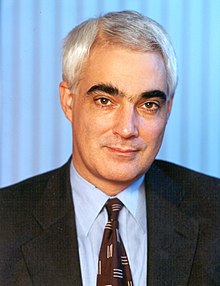The Lord Darling of Roulanish | |||||||||||||||||||||||||
|---|---|---|---|---|---|---|---|---|---|---|---|---|---|---|---|---|---|---|---|---|---|---|---|---|---|
 Official portrait, 2007 | |||||||||||||||||||||||||
| Chancellor of the Exchequer | |||||||||||||||||||||||||
| In office 28 June 2007 – 11 May 2010 | |||||||||||||||||||||||||
| Prime Minister | Gordon Brown | ||||||||||||||||||||||||
| Preceded by | Gordon Brown | ||||||||||||||||||||||||
| Succeeded by | George Osborne | ||||||||||||||||||||||||
| In office 5 May 2006 – 27 June 2007 | |||||||||||||||||||||||||
| Prime Minister | Tony Blair | ||||||||||||||||||||||||
| Preceded by | Alan Johnson | ||||||||||||||||||||||||
| Succeeded by | John Hutton[a] | ||||||||||||||||||||||||
| Secretary of State for Scotland | |||||||||||||||||||||||||
| In office 13 June 2003 – 5 May 2006 | |||||||||||||||||||||||||
| Prime Minister | Tony Blair | ||||||||||||||||||||||||
| Preceded by | Helen Liddell | ||||||||||||||||||||||||
| Succeeded by | Douglas Alexander | ||||||||||||||||||||||||
| Secretary of State for Transport | |||||||||||||||||||||||||
| In office 29 May 2002 – 5 May 2006 | |||||||||||||||||||||||||
| Prime Minister | Tony Blair | ||||||||||||||||||||||||
| Preceded by | Stephen Byers[b] | ||||||||||||||||||||||||
| Succeeded by | Douglas Alexander | ||||||||||||||||||||||||
| Secretary of State for Work and Pensions[c] | |||||||||||||||||||||||||
| In office 27 July 1998 – 29 May 2002 | |||||||||||||||||||||||||
| Prime Minister | Tony Blair | ||||||||||||||||||||||||
| Preceded by | Harriet Harman | ||||||||||||||||||||||||
| Succeeded by | Andrew Smith | ||||||||||||||||||||||||
| Chief Secretary to the Treasury | |||||||||||||||||||||||||
| In office 3 May 1997 – 27 July 1998 | |||||||||||||||||||||||||
| Prime Minister | Tony Blair | ||||||||||||||||||||||||
| Preceded by | William Waldegrave | ||||||||||||||||||||||||
| Succeeded by | Stephen Byers | ||||||||||||||||||||||||
| |||||||||||||||||||||||||
| |||||||||||||||||||||||||
| Personal details | |||||||||||||||||||||||||
| Born | Alistair Maclean Darling 28 November 1953 Hendon, Middlesex, England | ||||||||||||||||||||||||
| Died | 30 November 2023 (aged 70) Edinburgh, Scotland | ||||||||||||||||||||||||
| Political party | Labour | ||||||||||||||||||||||||
| Other political affiliations | International Marxist Group[1] | ||||||||||||||||||||||||
| Spouse |
Margaret Vaughan (m. 1986) | ||||||||||||||||||||||||
| Children | 2 | ||||||||||||||||||||||||
| Alma mater | University of Aberdeen | ||||||||||||||||||||||||
| Signature | |||||||||||||||||||||||||
Alistair Maclean Darling, Baron Darling of Roulanish, PC (28 November 1953 – 30 November 2023) was a British politician who served as Chancellor of the Exchequer under prime minister Gordon Brown from 2007 to 2010. A member of the Labour Party, he was a member of Parliament (MP) from 1987 to 2015, representing Edinburgh Central and Edinburgh South West.
Darling was first appointed chief secretary to the Treasury by prime minister Tony Blair in 1997, and was promoted to secretary of state for work and pensions in 1998. After spending four years at that department, he spent a further four years as secretary of state for transport, while also becoming secretary of state for Scotland in 2003. Blair moved Darling for a final time in 2006, making him president of the Board of Trade and secretary of state for trade and industry. After Brown succeeded Blair as prime minister, he promoted Darling to replace himself as chancellor of the Exchequer in 2007, a position he remained in until 2010.[2] He served as chancellor during the 2007–2008 financial crisis and the Great Recession.
From 2012 to 2014, Darling was the chairman of the Better Together Campaign, a cross-party group that successfully campaigned for Scotland to remain part of the United Kingdom in the 2014 independence referendum.[3] He was a vocal advocate for the Remain campaign for the 2016 European Union membership referendum.[4] In November 2014, Darling announced that he was standing down at the 2015 general election.[5] He was nominated for a life peerage in the 2015 Dissolution Honours and sat in the House of Lords until his retirement in 2020.[6]
According to the Financial Times, Darling was "one of the most consequential post-war chancellors in modern British history".[7]
Cite error: There are <ref group=lower-alpha> tags or {{efn}} templates on this page, but the references will not show without a {{reflist|group=lower-alpha}} template or {{notelist}} template (see the help page).
- ^ https://www.newstatesman.com/politics/2017/08/tony-blair-isnt-only-new-labour-figure-far-left-past
- ^ "Alistair Darling, former British chancellor, joins Morgan Stanley board". The Guardian. Press Association. 9 December 2015. Archived from the original on 9 September 2018. Retrieved 9 September 2018.
- ^ "Scottish independence: Darling launches Better Together campaign". BBC News. 24 June 2012. Archived from the original on 25 June 2012. Retrieved 25 June 2012.
- ^ Stewart, Heather (1 June 2016). "George Osborne and Alistair Darling unite against Vote Leave". The Guardian. Archived from the original on 9 September 2018. Retrieved 9 September 2018.
- ^ "Alistair Darling to stand down as MP". BBC News. 3 November 2014. Archived from the original on 3 November 2014. Retrieved 4 November 2014.
- ^ "Ex-chancellor Alistair Darling retires from House of Lords". STV News. 28 July 2020. Archived from the original on 24 March 2023. Retrieved 8 August 2020.
- ^ Giles, Chris (30 November 2023). "Alistair Darling, UK chancellor, 1953–2023". Financial Times. Retrieved 1 December 2023.